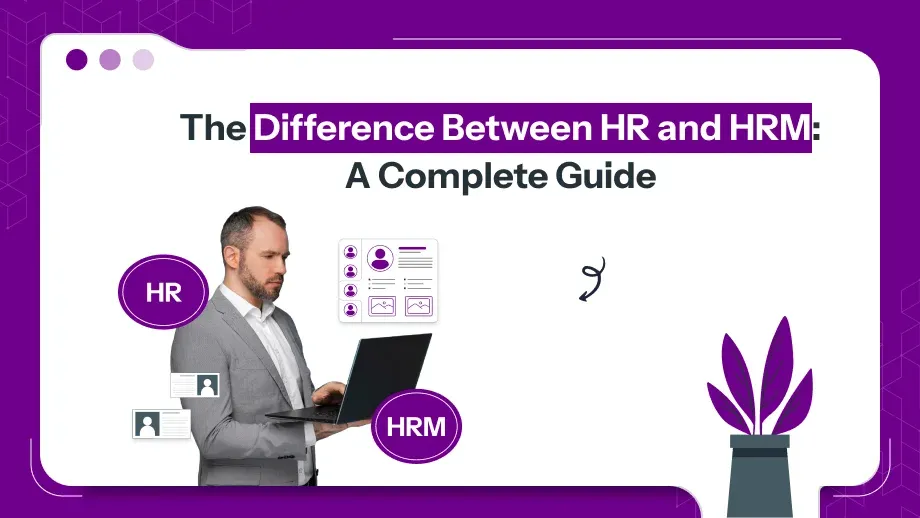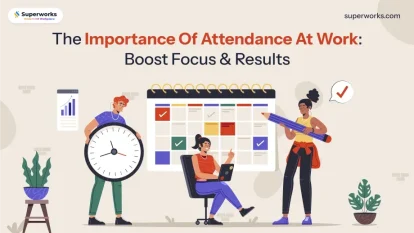
To succeed, the core of every business is managing people. However, everybody gets confused between HR and HRM. The meanings of these two terms are very close to each other but denote the two different aspects of workforce management. This guide will clarify the difference between HR and HRM, explain the unique roles that both play and show businesses how they can use them for success.
What is HR?
HR refers to the department or function of any organization that takes care of the administrative and operational roles of the human resource force. Its main business deals with core activities intended to help employees go about their work schedules.
Core Responsibilities of HR
- Recruitment and Onboarding: Identification of candidates, interviewing them, and getting new employees started
- Payroll Management: Handling timely and accurate employee pay, taxes, and the withholding of benefits.
- Employee Relations: Complaints, dispute resolution, and harmony in the workplace.
- Compliance: Labor law compliance, workplace safety, and compliance with general workplace standards.
- Record Keeping: Employee files maintenance and data integrity.
HR human resource management focuses primarily on these daily tasks to maintain smooth operations within the organization. However, its scope is transactional and operational rather than strategic.
What is HRM?
This is to say that human resource management system is more than just the normal administrative functions associated with HR, but instead uses a strategic view of managing human resources in support of the business’s overall aims.
Core Responsibilities of HRM
- Strategic Workforce Planning: Identify what talent will be needed in the future and place the right people in the organization to meet these needs.
- Talent Management: Source, retain, and develop to gain advantage.
- Performance Management: Defining clear objectives, providing feedback, and professional growth.
- Policy Development: Creating frameworks that foster a positive and productive workplace culture.
- Cultural Development: Encouraging collaboration, innovation, and employee engagement across teams.
In essence, HRM is proactive and focuses on the long-term development of the organization’s human capital.
Confused about the difference between HR and HRM?
We'll explain it to you. Learn how operational and strategic HR roles work together!
Key Difference Between HR And HRM
Although difference between hr and hrm share common goals, they differ significantly in their approach, scope, and impact. Let’s explore these differences:
| Aspect |
HR |
HRM |
| Definition |
Day-to-day employee management. |
Strategic management of the workforce. |
| Scope |
Operational and transactional. |
Strategic and transformational. |
| Focus |
Managing current employees. |
Developing workforce for the future. |
| Approach |
Reactive (solving issues as they arise). |
Proactive (anticipating and planning). |
| Tools Used |
Basic systems like payroll software. |
Advanced platforms like cloud-based HRMS software. |
The difference between HR and HRM is the scope: HR focuses on immediate needs, whereas HRM prepares organizations for sustainable growth.
Why Understanding the Difference Matters?
Understanding the difference between HR and HRM is important for organizations to optimize their human resource functions. Here’s why:
Improved Decision-Making
Knowing whether you need operational support (HR) or strategic alignment (HRM) helps businesses make better decisions about team structures and investments.
Efficient Resource Allocation
Clear differences between HR and HRM help organizations manage their resources properly, thereby ensuring both short-term and long-term goals are achieved.
Better Technology Adoption
Modern tools like attendance management system software or HRMS tools in India are designed to handle the difference between hr and hrm functions, bridging the gap between operational efficiency and strategic planning.
Enhanced Employee Satisfaction
HRM builds a framework for employee development, while HR ensures daily operations run smoothly. Together, they create a balanced approach that improves employee experiences.
The Importance of HR and HRM
The difference between hr and hrm are the basic building blocks for a well-functional organization. Here, HR builds a base in employee management that aligns its employees toward the vision of the company and the set goals it achieves. The main function of HRM is mainly strategic, concentrating on workforce planning, talent retention, and performance management. This difference makes all the difference in striking a balance between operational efficiency and long-term growth for the organizations.
Even though it is true that HR is necessary for managing the day-to-day employee needs in India to ensure the smooth running of activities with the help of tools like attendance management system software and HRMS tools, the proactive nature that HRM takes to ensure the management of strategic workforce development with the help of technologies like cloud based HRMS software assures the business continues to be agile and competitive within today’s fast-changing environment.
Difference Between HR Strategy and Strategic HRM
The two concepts are difference between HR strategy and strategic HRM because of the focus aspect. A simple strategy of HR refers to the plans for specific functions, such as recruiting or training. In contrast, strategic HRM involves a close integration of all HR activities into a cohesive framework in harmony with organizational goals.
Understanding this distinction helps businesses implement comprehensive workforce solutions rather than isolated improvements.
HR Strategy
- Focuses on specific functions like recruitment, payroll, or training.
- Works within predefined goals to address immediate challenges.
- Example: Implementing a policy to reduce employee turnover in a specific department.
Strategic HRM
- Integrates all HR activities into a unified framework aligned with business objectives.
- Focuses on long-term workforce development and organizational growth.
- Example: Developing a company-wide succession plan to prepare for leadership transitions.
Understanding this HR and HRM difference is vital for businesses to implement cohesive workforce solutions. Strategic HRM allows companies to adopt tools like HRMS software in India to align HR activities with broader goals.
The Role of Technology in HR and HRM
Technology has emerged to change the way HR vs HRM is handled in any business. The process has become faster, more efficient, and reliant on data. It bridged the gap between the operational focus of HR and the strategic orientation of HRM. Modern tools like HRMS tools in India facilitate everything from payroll automation to performance analytics.
Key Ways Technology Supports HR
- Automation of Routine Tasks: With attendance management system software, routine tasks such as the time-consuming process of manual entry are eliminated because they are error-prone.
- Streamlined Recruitment: AI-enabled platforms screen the candidates, schedule interviews, and manage job postings.
- Improved Compliance: Technology keeps track of labor laws and updates policies automatically.
Key Ways Technology Enhances HRM
- Data-Driven Insights: Advanced tools, such as cloud-based HRMS software, proffer predictive analytics to help managers predict their hiring needs and identify retention risks.
- Performance Tracking: Automated dashboards track productivity at the individual and team levels in real time.
- Strategic Workforce Planning: Tools offer detailed insights to align HR strategies with business goals.
Implementing the best HRMS and payroll software in India, business houses ensure that the business’s HR activities are aligned directly with HRM strategies. Here, it gets both immediate efficacy and long-term success.
The Role of an HR Manager in HRM
This means that the role of the HR manager in HRM will change because organizations are now moving from traditional HR functions to more strategic management of their workforce. The HR manager tool is no longer an administrator but a strategist who plays a crucial part in achieving business success.
Key Responsibilities of HR Managers in HRM
- Talent Development: Identify training needs and develop programs to enhance employee skills.
- Workforce Planning: Forecast future people’s needs based on organizational goals.
- Employee Engagement: Developing HRM strategies to enhance employee satisfaction as well as reduce turnover.
- Performance Analytics: Using data from cloud-based HRMS software to track and improve productivity.
Tools to Support HR Managers
To fulfill their strategic roles, HR managers rely on modern solutions like:
- HRMS tools in India for streamlined processes.
- Attendance management system software for real-time tracking.
- Best HRMS solutions for analytics-driven decision-making.
By using these tools, HR managers can bridge the difference between HR and HRM to attain both operational and strategic goals.
Conclusion
The difference between HR and HRM expresses the change in workforce management. HR is about running day-to-day operations whereas HRM is about planning for the future workforce which meets business objectives. By harnessing modern tools such as cloud-based HRMS software or attendance management system software, businesses can integrate the functions of HR and HRM effectively. Whether it is payroll management or the strategy planning of your workforce, technology will help empower your team toward long-term success. Let your business flourish with the best HRMS and payroll software in India tailored for both the unique needs of the difference between HR and HRM.









